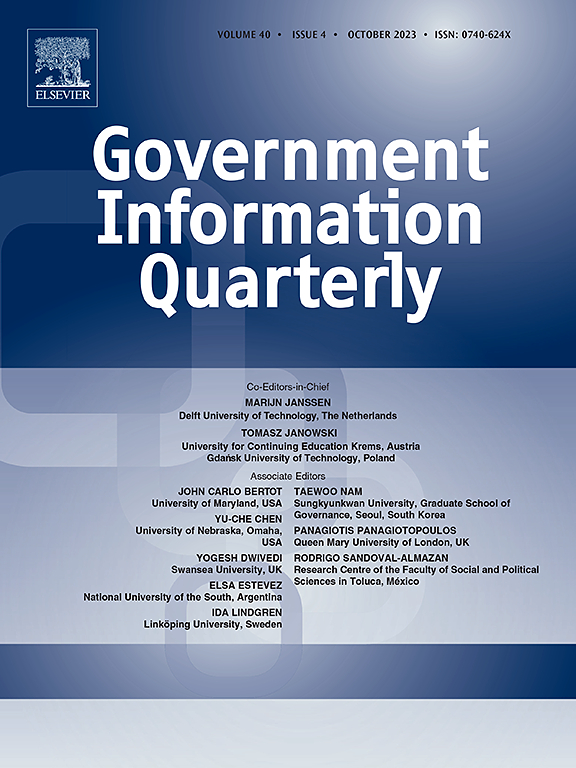人工智能在公共管理中的应用:公共部门管理人员和公共部门非管理人员的视角
IF 10
1区 管理学
Q1 INFORMATION SCIENCE & LIBRARY SCIENCE
引用次数: 0
摘要
人工智能(AI)正日益渗透到包括公共行政在内的社会各个方面。在这种情况下,公务员在采用新技术方面发挥着关键作用。本研究采用实验设计,调查了公共部门管理者实施人工智能的意愿,以及公共部门非管理员工出于各种内部管理目的接受人工智能的意愿。我们的研究结果表明,人们普遍对人工智能持怀疑态度,人们更倾向于让人工智能发挥支持性作用,而不是(共同)决定或完全自主的作用。此外,对人工智能的态度取决于内部管理实践的性质,需要更多“软”(人际关系)技能的实践会引发对人工智能参与的更大犹豫。此外,我们的结果还强调了管理者和非管理者之间的微妙差异,管理者比非管理者更倾向于实施广泛的人工智能参与,特别是对于主要要求“硬”(技术)技能的实践。通过对人工智能在公共管理中的应用提供更细致入微的理解,本研究提供了重要的理论和实践见解。本文章由计算机程序翻译,如有差异,请以英文原文为准。
AI adoption in public administration: Perspectives of public sector managers and public sector non-managerial employees
Artificial intelligence (AI) is increasingly infusing various facets of society, including public administration. In this setting, public servants play a pivotal role in the adoption of new technologies. Using an experimental design, the present study investigated public sector managers' willingness to implement AI and public sector non-managerial employees' willingness to accept AI for various internal management purposes. Our findings point to prevailing skepticism toward AI, with a preference for AI serving in a supportive rather than a (co)decisive or fully autonomous role. Additionally, attitudes toward AI vary depending on the nature of the internal management practice, with practices requiring more ‘soft’ (interpersonal) skills eliciting greater hesitancy toward AI involvement. Furthermore, our results also highlight a subtle disparity between managers and non-managers, with managers being slightly more inclined to implement extensive AI involvement than non-managers are willing to accept, particularly for practices demanding mainly ‘hard’ (technical) skills. By providing a more nuanced understanding of AI adoption in public administration, the present study offers important theoretical and practical insights.
求助全文
通过发布文献求助,成功后即可免费获取论文全文。
去求助
来源期刊

Government Information Quarterly
INFORMATION SCIENCE & LIBRARY SCIENCE-
CiteScore
15.70
自引率
16.70%
发文量
106
期刊介绍:
Government Information Quarterly (GIQ) delves into the convergence of policy, information technology, government, and the public. It explores the impact of policies on government information flows, the role of technology in innovative government services, and the dynamic between citizens and governing bodies in the digital age. GIQ serves as a premier journal, disseminating high-quality research and insights that bridge the realms of policy, information technology, government, and public engagement.
 求助内容:
求助内容: 应助结果提醒方式:
应助结果提醒方式:


